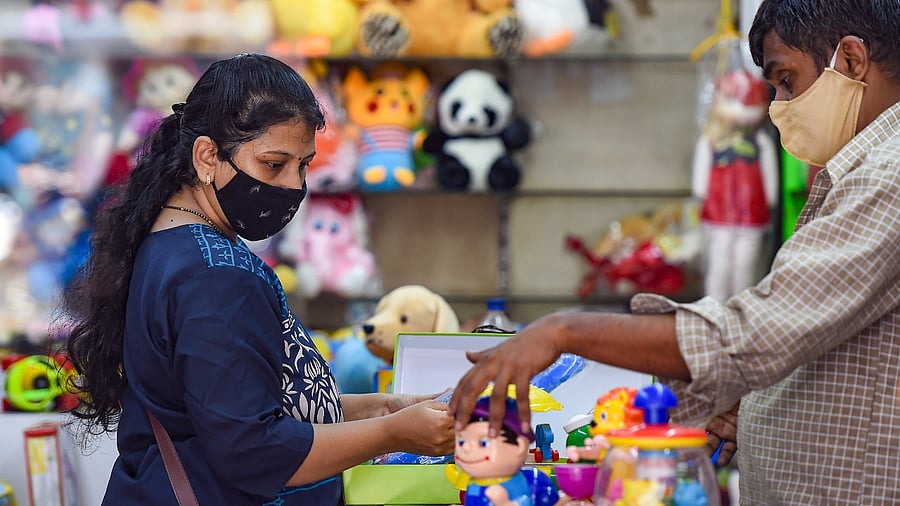
Representative image showing toys.
Credit: PTI Photo
Bengaluru: How safe is recycling and repurposing plastic? A report has found harmful chemicals -- including the banned Single Chain Chlorinated Paraffins (SCCPs) and Bisphenol A (BPA)-- in toys and food containers made of recycled plastic, recommending a strict regulatory regime and quality control to monitor the recycled products.
Researchers from Toxics Link identified the recycled product making areas in Delhi and collected samples from various units as well as weekly and local markets. The type of plastic (virgin, semi or recycled) along with the polymer type of each sample was identified by experts. The samples made of semi and recycled plastic were selected for tests.
Of the 15 samples collected, six were food contact materials designed to store, package and process food, where contact with food is often for extended periods. Sauce and water bottles, casseroles, masala boxes, milk drums and other food containers found to contain BPAs, seen as highly toxic, ranging from 0.34 mg/kg to 40.9 mg/kg.
"The exposure time increases the likelihood of chemical migration, resulting in higher potential for direct ingestion by humans. Despite the complete bans on certain chemicals such as SCCPs (banned in 2017) and BPA, their presence in FCM poses a high risk of contamination for both children and adults, raising questions about the effectiveness of these bans," the report said.
The laboratory analysis of the recycled plastic samples showed that 10 of the 15 samples had presence of one or more chemicals including BPA, CPs (SCCPs), heavy metals (As, Cd and Cr), phthalates (DEHP and DINP) and Nonylphenol, a chemical declared toxic due to its resistance to biodegradation and leading to bioaccumulation.
Out of the 15 samples, 8 contained BPA at concentration ranging from 0.30 mg/kg to 161 mg/kg; 4 samples contained SCCPs at concentration ranging from 111 mg/kg to 338 mg/kg and four others had Nonylphenol at concentration ranging from 38.5 mg/kg to 522 mg/kg. Two samples had heavy metals, while three had phthalates. Six samples contained multiple chemicals and two revealed exceptionally high rates of chemical detection.
When compared with food containers, toys showed the highest concentration of chemicals, highlighting the vulnerability of children.
"Specifically, 86 per cent of the toy samples contained chemicals while 67 per cent of the food contact materials were detected with chemicals," the report added.
Apart from the chemicals, the tests also showed lead, chromium and cadmium in two samples. The report noted that the study tested only 15 chemicals and heavy metals and "there could be other harmful chemicals present".
Satish Sinha, Associate Director of Toxics Link, says that serious action must be taken soon. “In view of the growing scientific evidence on the presence of highly hazardous and toxic chemicals in recycled products, the recycling of plastic is fraught with serious threat to human health. We must not advocate for indiscriminate recycling of plastic as a strategy for waste minimization,” he said. “Instead, the focus must be on removing toxic chemicals from plastics.”
As per the Central Pollution control Board, India generates more than 4 million tonnes of plastic every year. While a significant portion of that waste ends up in landfills, less than 10 per cent is recycled. Given the government's emphasis on recycling, the lack of "specific standards or norms for the recycling process" is a key concern that needs to be addressed, the report said.